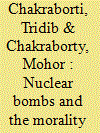| Srl | Item |
| 1 |
ID:
174476


|
|
|
|
|
| Summary/Abstract |
Seventy-five years after the horrific atomic attacks on Hiroshima and Nagasaki, we all still live under the existential threat of a catastrophic nuclear war. Although citizen pressure and hard-nosed U.S. diplomacy have yielded agreements that have cut the number of U.S. and Russian nuclear weapons, prevented their proliferation, and banned nuclear testing, there are still far too many nuclear weapons, and the risk of nuclear war is growing.
|
|
|
|
|
|
|
|
|
|
|
|
|
|
|
|
| 2 |
ID:
145893


|
|
|
|
|
| Summary/Abstract |
The atomic bombing of Hiroshima and Nagasaki, led by the US in August 1945, remains the most brutal insignia of the Second World War. Seventy-one years after this incident, the recent visit of the US President, Barack Obama to the Hiroshima War Memorial has resurrected several issues related to the apocalyptic bombings, foremost among which is the question of a pending apology by the perpetrators of this ‘crime against humanity’. The devastating consequences of the use of nuclear weapons in war cannot be justified on moral grounds, in keeping with which, the International People’s Tribunal (2007) has declared the twin bombings as both a ‘war crime’ and a ‘crime against humanity’. Although President Obama espouses a world free of nuclear weapons, their complete elimination seems too far-fetched and utopian, at least in the short-term. Fortunately, the existence of mechanisms to prevent non-proliferation could contribute towards checking the increase in nuclear stockpiles and facilitate steps towards greater international peace and security.
|
|
|
|
|
|
|
|
|
|
|
|
|
|
|
|
| 3 |
ID:
147556


|
|
|
|
|
| Summary/Abstract |
While nuclear weapons were conceived to end a war, in the aftermath of their operational use at Hiroshima and Nagasaki, they became the central (and controversial) means to prevent a war. Nuclear deterrence formed the foundation of U.S. Cold War doctrine and the basis of an extended security guarantee to our allies. But the Cold War ended one-quarter century ago, and questions about the efficacy of deterrence, the need for nuclear weapons, and the ethics surrounding them have resurfaced as some call for further major reductions in inventory or the complete elimination of the U.S. nuclear arsenal. Discussed from the perspective of a military practitioner, this essay highlights the continuing need for U.S. nuclear weapons in a global security environment that is highly complex and uncertain, and describes the means by which the credibility of the nuclear portion of the strategic deterrent is being preserved even as the role and prominence of these weapons have been reduced.
|
|
|
|
|
|
|
|
|
|
|
|
|
|
|
|